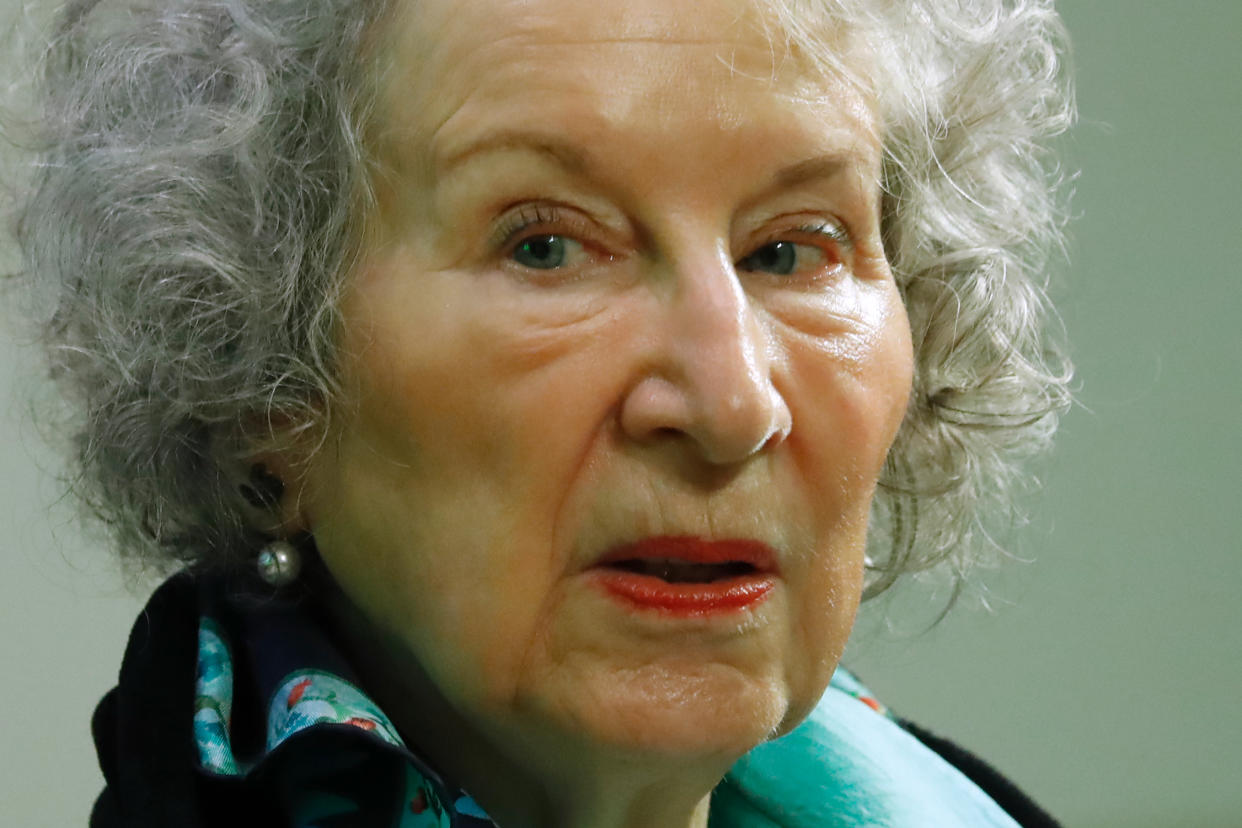Margaret Atwood speaks in favour of 'empowering' strip club work

Margaret Atwood has spoken out in favour of stripping, calling it 'empowering'.
The 79-year-old Canadian author of ‘The Handmaid’s Tale’ said the practice can make women feel “in control of a room”.
Atwood, whose long-anticipated ‘Handmaid’s Tale’ sequel, ‘The Testaments’, was published earlier this week, weighed in on a feminist debate over strip club licensing.
The number of sex shops and lap dancing clubs in England have fallen by a third in the past five years, according to a response to a Freedom of Information request released last year.
While there are of course male strip clubs in the UK, such as ‘Dreamboys’, the industry has traditionally been female, and it was the position of strip clubs featuring female dancers which Atwood was discussing.
READ MORE: The fastest-growing 'sugar baby' UK universities revealed... but at what cost?
“A lot of women actually do find [stripping] empowering. They feel they’re in control of the room when they’re doing it,” she told Emma Barnett on BBC Radio 5 Live’s Headliners programme.
Atwood, who is widely regarded as a key feminist voice for the 21st century, argued women should have the choice to work in strip clubs, a job which is often better paid than other low-paid professions.
![Can strip clubs ever be feminist? [Photo: Getty]](https://s.yimg.com/ny/api/res/1.2/ZCkOiAcysYmKkDIjr3ViWA--/YXBwaWQ9aGlnaGxhbmRlcjt3PTk2MDtoPTY0MA--/https://media-mbst-pub-ue1.s3.amazonaws.com/creatr-images/2019-09/b53be420-d611-11e9-bbb4-70c186b18223)
However, she addressed the limits of this argument, adding stripping is only empowering if strippers are in control of the money they earn.
“It depends very much on whether they are being exploited or not, whether someone is taking all the money... or whether they are in control of it,” she added. “If it’s a choice a woman has made... and you get paid much better for it than if you’re working a shift in a coffee chain, then why are you not going to let that woman make that choice?”
Yesterday, it was revealed councillors in Ealing – a London borough – are moving to issue a policy against any strip clubs being licensed in the area, after the area’s only adult entertainment venue, LA Confidential Club, shut down.
“I’m looking forward to consulting on a new licensing policy to further reduce the number of sexual entertainment venues in Ealing to zero, as these establishments do not support our vision for the borough and our night-time economy,” Joanna Camadoo-Rothwell, council cabinet member for community safety and inclusion, said in a statement on the Ealing council website.
Sheffield City Council has also recently investigated a branch of strip club franchise Spearment Rhino for breaking “sex acts” rules.
But according to Atwood, such efforts to shut down strip clubs are misdirected compared to more important issues than “who got their clothes off” – such as climate change.
“I’m saying you can do that [debate stripping] if you want,” she said. “But my choice would be to put it with something that’s going to change the needle on climate, because if we don’t solve that we’re all going to stop breathing and then it won’t matter who’s got their clothes on and who’s got their clothes off.”
While this is the first time Atwood has spoken publicly about her own view on stripping, it is a topic she has explored in her literature.
READ MORE: Singer Lauren Mayberry hits back at critics who claim her stage outfits are 'too revealing'
In her poem, ‘Helen of Troy Does Countertop Dancing’, Atwood’s character Helen is a countertop dancer who believes working as a cashier “selling gloves” is more demeaning than her profession.
“Exploited, they’d say. Yes, any way/you cut it, but I’ve a choice/of how, and I’ll take the money,” reads an extract from the poem, from Atwood’s collection ‘Morning in the Burned House’ published in 1995.
Can strip clubs be feminist?
Stripping is a topic conversation currently, amid the release of Jennifer Lopez’s new film, ‘Hustlers’.
In the movie - which has glowing reviews, so far - Lopez stars as a veteran stripper who helps to scam wealthy men out of money.
The film is based on a true story.
Not Buying It, a body which campaigns for change in the porn and sex industries, claims strip club workers are exploited and often pressured into doing sex work to earn more money.
Officially, lap dances are supposed to involve no sexual contact.
“Actual sexual contact is the norm across the industry, it argues on its website, as well as “underage dancers and trafficking”.
The Truth about Spearmint Rhino Sheffield https://t.co/xTzkXWS6EI@WEPSheffield @sammywoodhouse1 @SarahChampionMP @ZeroOption4Shef @OBR_Sheffield @SheffieldWomen @WomanchesterMMN @LeedsReSisters @ResistersUK @gemma_brett @FiLiA_charity @CEASEorgUK @SaveOurEyes @uracontra_
— Not Buying It (@not_buyingit) September 11, 2019
It encourages the public to support the closure of a number of strip clubs across the country, who have breached regulations.
However, United Voices of the World, a body which aims to protect the “basic rights” of UK strippers, welcomed Atwood’s comments.
A representative told Yahoo UK: “At United Voices of the World (UVW), the trade union representing strippers across the UK, we were glad to hear about Margaret Atwood's support of strippers' right to make choices about their own work.
“While some women find stripping empowering, most consider it a job like any other. Dancers shouldn't be under pressure to justify their choice of work, which enables them to pay for university fees, put a roof over their head or feed their families, like the rest of us.”
“However, we wholeheartedly agree with Atwood about the need to fight against exploitation in the industry. Strippers across the UK are currently organising for their rights at work, including the right to join a trade union, have basic holiday and sick pay and have protection from harassment and discrimination. We call on all feminists to join us in the struggle for better working rights for all workers, no matter what job they do.”



